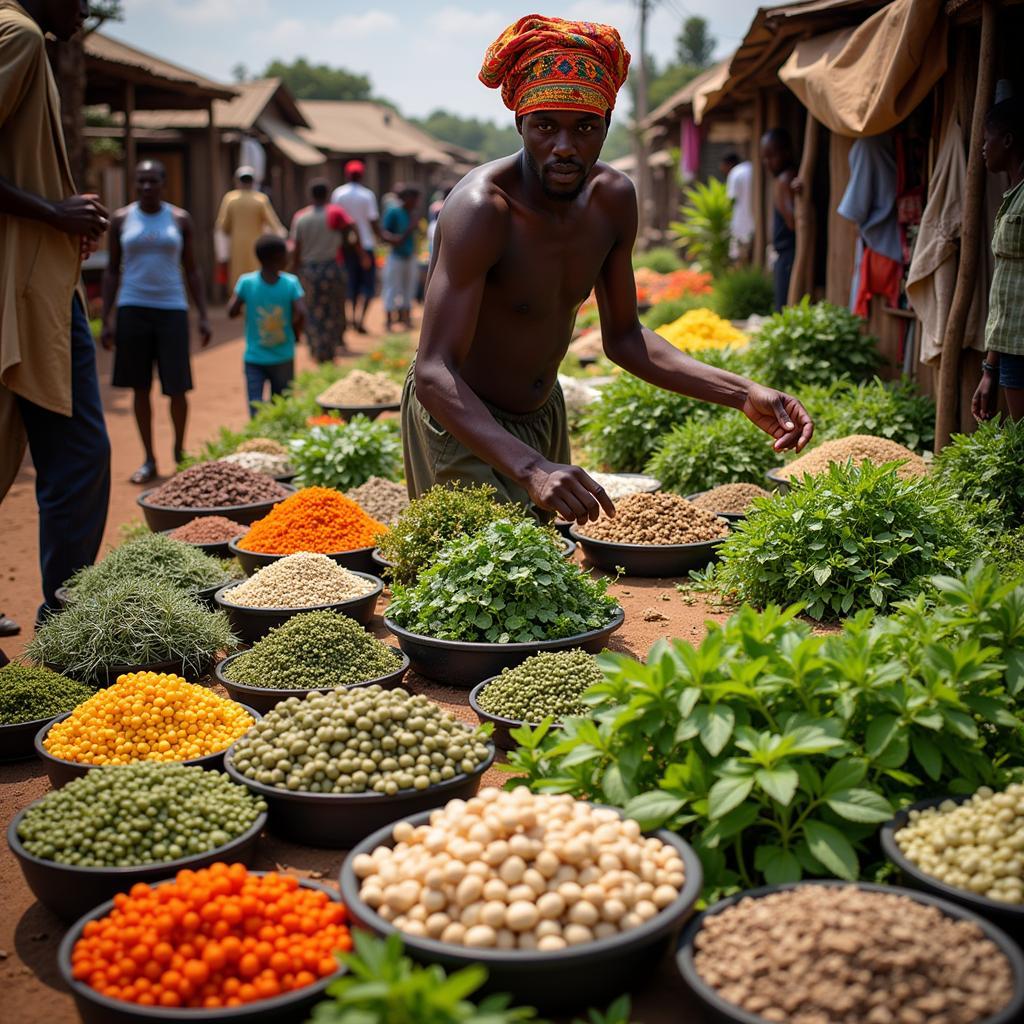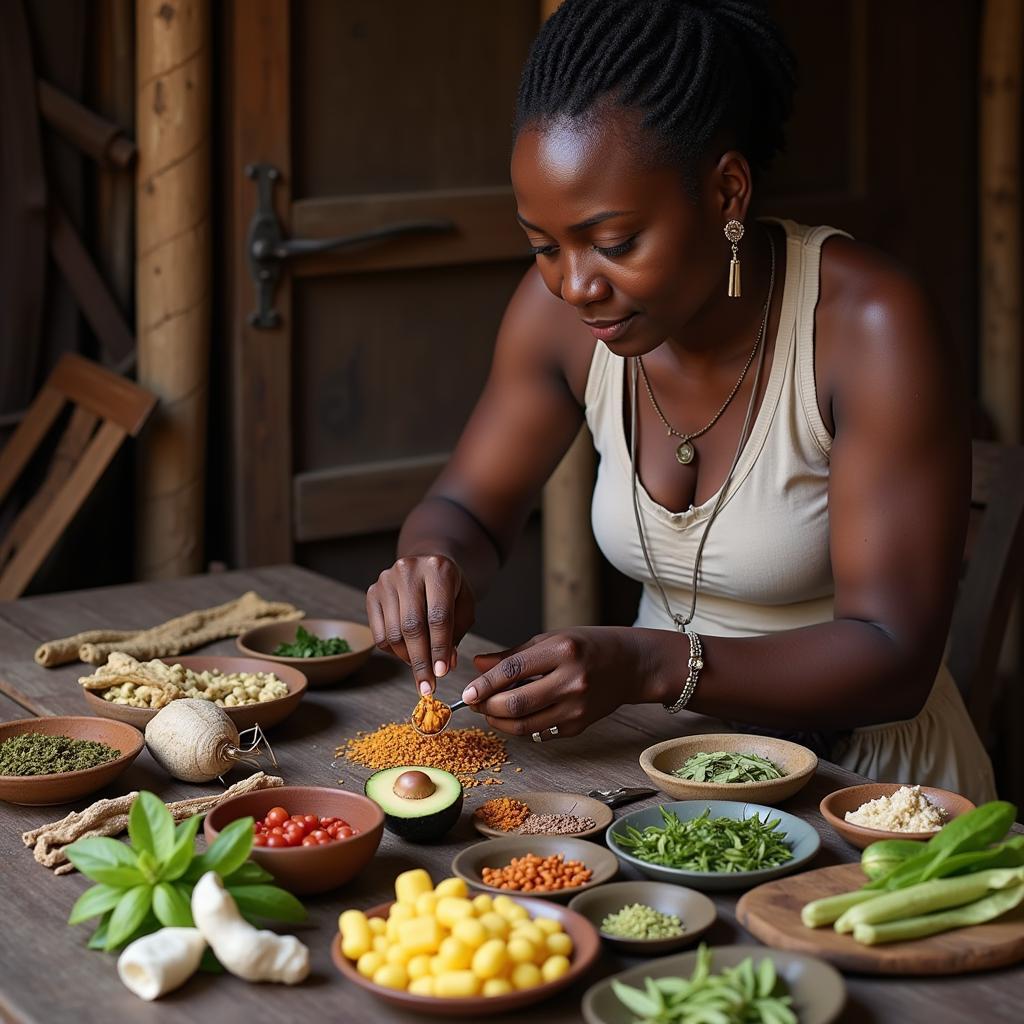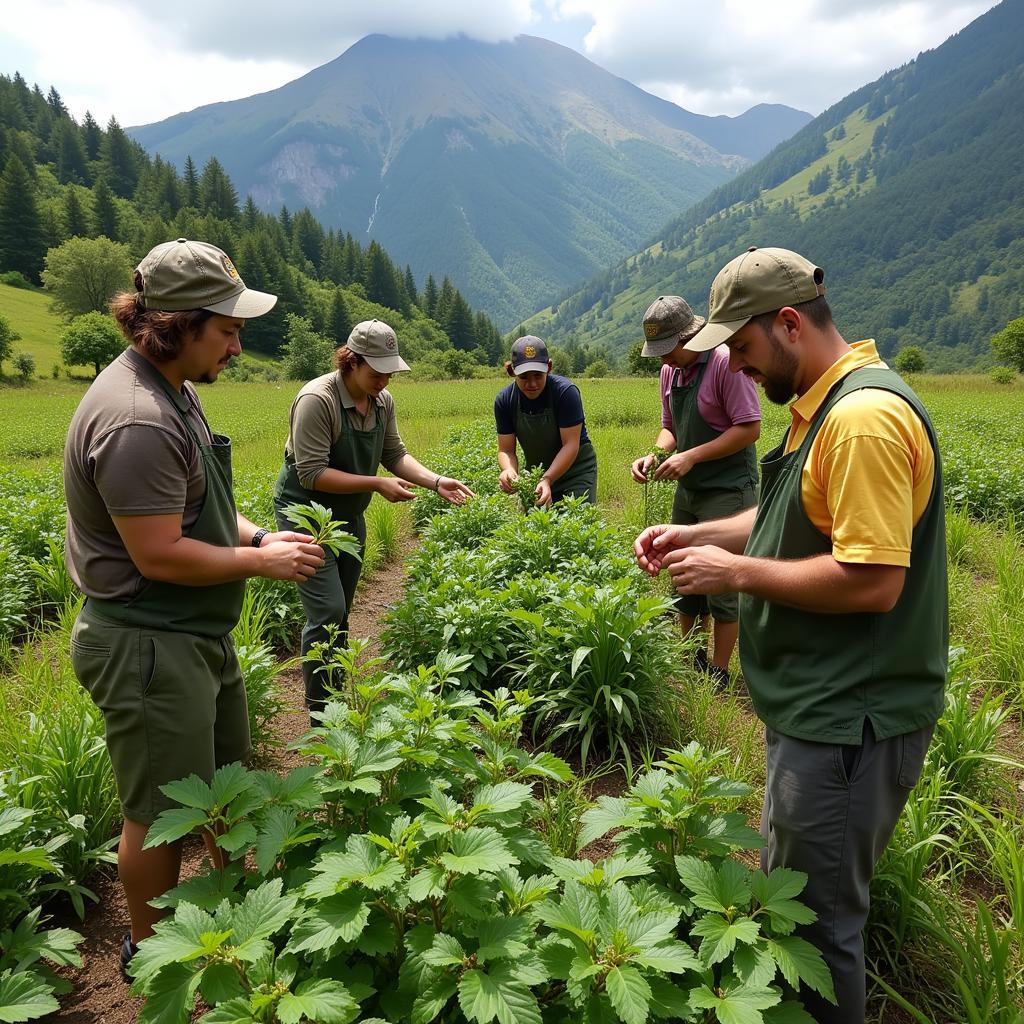Exploring the World of African Herbs Medicine
African Herbs Medicine, a cornerstone of traditional healthcare systems across the continent, is experiencing a resurgence of interest globally. For centuries, communities in Africa have relied on the potent properties of indigenous plants to treat a wide range of ailments, from minor illnesses to chronic diseases. This deep-rooted connection with nature has resulted in a wealth of knowledge passed down through generations, shaping the landscape of African traditional medicine.
 Vibrant African Herbs Market
Vibrant African Herbs Market
A Legacy of Healing: Understanding African Herbs Medicine
Unlike modern medicine, which often focuses on treating specific symptoms, African herbs medicine takes a holistic approach, considering the physical, emotional, and spiritual well-being of an individual. This approach recognizes the interconnectedness of the body and seeks to restore balance and harmony to promote healing.
African herbs medicine encompasses a vast array of plant-based remedies, each with unique properties and applications. These range from widely known herbs like rooibos, renowned for its antioxidant properties, to lesser-known botanical treasures like African devil’s claw, traditionally used to alleviate pain and inflammation. This diversity reflects the continent’s varied ecosystems, each contributing to the rich tapestry of African traditional healing.
 African Healer Preparing Traditional Remedy
African Healer Preparing Traditional Remedy
Key Principles and Practices
Central to African herbs medicine is the concept of ‘Ubuntu,’ a philosophy emphasizing interconnectedness and the belief that the well-being of one is intrinsically linked to the well-being of all. This philosophy extends to the use of plants, advocating for sustainable harvesting practices to ensure the continued availability of these valuable resources for future generations.
Traditional healers, often revered figures within their communities, play a pivotal role in administering African herbs medicine. These healers undergo years of apprenticeship, learning to identify, prepare, and administer herbal remedies safely and effectively. Their knowledge is not merely limited to the properties of plants but also encompasses an understanding of the human body, disease pathology, and spiritual healing practices.
Modern Science and African Herbs Medicine: A Growing Synergy
While African herbs medicine has long been practiced within the continent, its efficacy is increasingly being recognized by modern science. Researchers are actively investigating the chemical composition of traditional African herbs, leading to the identification of bioactive compounds with potential therapeutic benefits.
For instance, studies on plants like African cherry and Sutherlandia frutescens have shown promising results in managing conditions like HIV/AIDS and cancer, sparking interest in their potential applications in modern medicine. This growing body of scientific evidence is helping to bridge the gap between traditional knowledge and contemporary healthcare practices, paving the way for a more integrated approach to health and wellness.
Navigating the World of African Herbs Medicine: Safety and Sustainability
As the global demand for natural remedies increases, it’s crucial to approach African herbs medicine with both respect and caution. While many traditional remedies have been used safely for generations, it’s essential to remember that “natural” doesn’t always equate to “safe.”
When considering using African herbs medicine:
- Consult a qualified healthcare professional: This is crucial, especially if you’re pregnant, breastfeeding, have pre-existing medical conditions, or are taking other medications.
- Source herbs from reputable suppliers: Look for suppliers committed to sustainable harvesting practices and quality control.
- Start with small doses: Observe your body’s response before gradually increasing the dosage, if necessary.
 Sustainable Harvesting of African Herbs
Sustainable Harvesting of African Herbs
The Future of African Herbs Medicine: Preservation, Innovation, and Global Recognition
As we move forward, it’s vital to preserve the rich heritage of African herbs medicine while fostering responsible innovation. This involves:
- Supporting research initiatives: Further scientific investigation is needed to validate traditional uses, identify new applications, and ensure the safe and effective use of African herbs.
- Promoting sustainable harvesting practices: Protecting biodiversity and ensuring the long-term availability of these valuable resources is paramount.
- Empowering local communities: Recognizing the intellectual property rights of traditional healers and ensuring they benefit from the growing interest in African herbs medicine is essential.
By embracing these principles, we can harness the power of African herbs medicine to contribute to a healthier and more sustainable future for all.
If you’d like to delve deeper into specific applications of African herbs medicine, you might find these articles insightful: African herbs for premature ejaculation and African American folk remedies.
FAQ
Q: Is African herbs medicine safe for everyone?
A: While many African herbs have a long history of safe use, it’s crucial to consult with a qualified healthcare professional before using them, especially if you’re pregnant, breastfeeding, have any medical conditions, or are taking other medications.
Q: Where can I find reputable sources for African herbs?
A: Look for suppliers committed to sustainable harvesting practices and quality control. You can also consult with traditional healers or herbalists with expertise in African herbs medicine.
Q: Can African herbs medicine be used alongside modern medicine?
A: It’s essential to discuss this with your doctor as some herbs can interact with conventional medications. Open communication with your healthcare provider is key to ensuring your safety and well-being.
For further assistance, feel free to contact us at +255768904061, email us at kaka.mag@gmail.com, or visit us at Mbarali DC Mawindi, Kangaga, Tanzania. Our dedicated customer support team is available 24/7 to assist you.
Explore our website for more captivating insights into the diverse facets of African Life, including African baby newborn, African frag, and the intriguing African basil plant.

